Key takeaways:
- Grief is a personal journey that often revisits multiple stages: denial, anger, bargaining, depression, and acceptance, with no right way to grieve.
- Hospital ministry plays a vital role in providing emotional and spiritual support, facilitating healing through connection and shared experiences.
- Spiritual support helps individuals process grief, find meaning in loss, and create connections that alleviate feelings of isolation.
- Encouraging others in grief involves being present, offering practical help, and sharing memories to honor the deceased and foster collective healing.
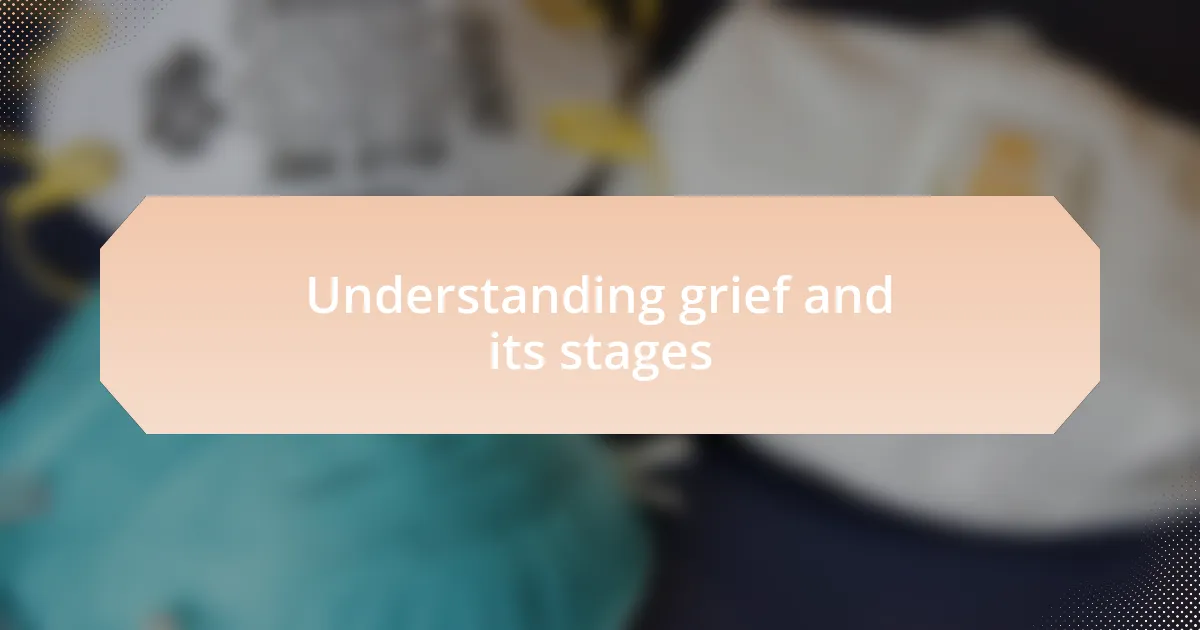
Understanding grief and its stages
Grief is a complex and deeply personal experience, often described in stages. Many are familiar with Elisabeth Kübler-Ross’s five stages: denial, anger, bargaining, depression, and acceptance. I remember feeling an overwhelming sense of denial when I first received the news of my parent’s passing—it was as if reality had paused, and I was just floating through life.
As I gradually moved through these stages, anger surfaced unexpectedly. I still recall that moment, sitting in my car, tears streaming down my face as I wrestled with feelings of injustice. It’s essential to recognize that there’s no right or wrong way to grieve. Have you ever felt that surge of anger over life’s unfairness? It’s a natural response, and acknowledging it can be a vital part of healing.
Eventually, I found a sense of acceptance, but it didn’t occur all at once; it was a journey. Each stage can be revisited repeatedly, sometimes even years after the loss. Understanding this ebb and flow is crucial. How many times have you thought you were “over it” only to feel the pang of loss again? Embracing these feelings allows us to develop a deeper connection with our grief and our memories, fostering a space for healing.
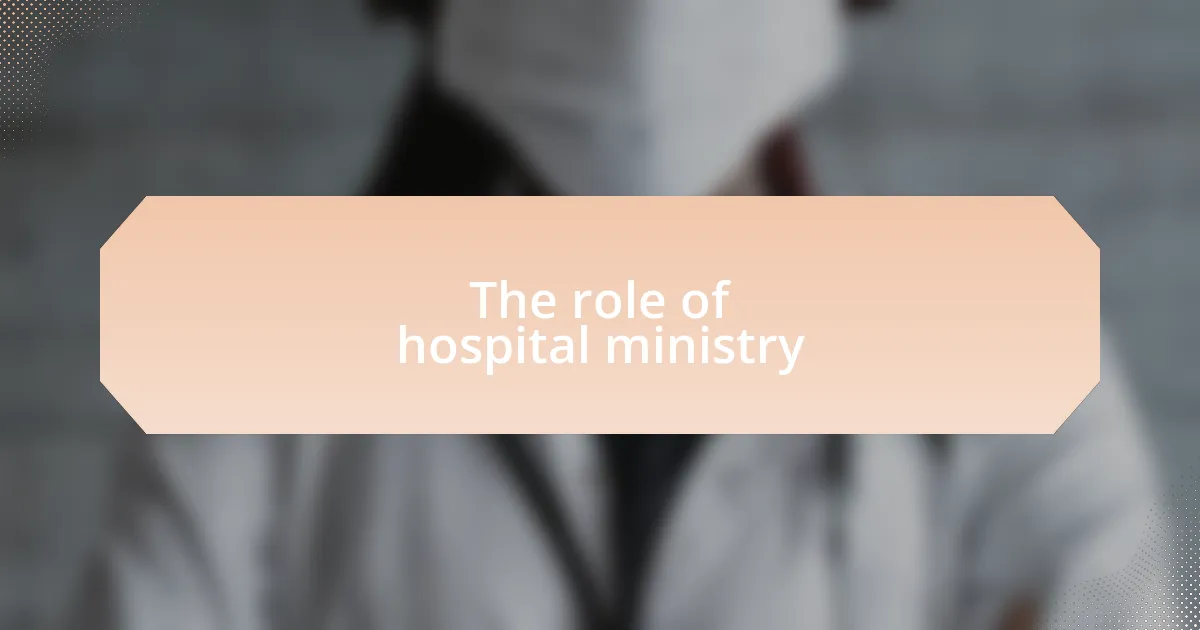
The role of hospital ministry
In the midst of grief, the role of hospital ministry becomes profoundly significant. I remember my time in the hospital, feeling overwhelmed when I didn’t know where to turn. The chaplain’s visit provided me with a moment of solace; their empathetic listening and gentle presence made a tangible difference. Have you ever had someone simply sit with you in silence and let the tears flow? That connection can help unravel layers of grief.
Hospital ministry acts as a bridge between the medical and emotional realms. It offers spiritual support, fostering a safe environment for individuals to express their feelings. Reflecting on my own experience, the chaplain helped me articulate my fears and hopes, which I didn’t even realize were pressing at the time. Isn’t it remarkable how articulating our pain can sometimes begin the healing process?
Additionally, hospital ministers often lead rituals or ceremonies that honor the deceased, creating a sense of closure. I participated in a small memorial service organized by the ministry, which turned out to be a pivotal moment for me. In sharing stories and memories with others, I felt an unexpected lightness. Have you experienced the power of sharing memories? It can lift the weight of grief, transforming it into a shared journey of remembrance and healing.
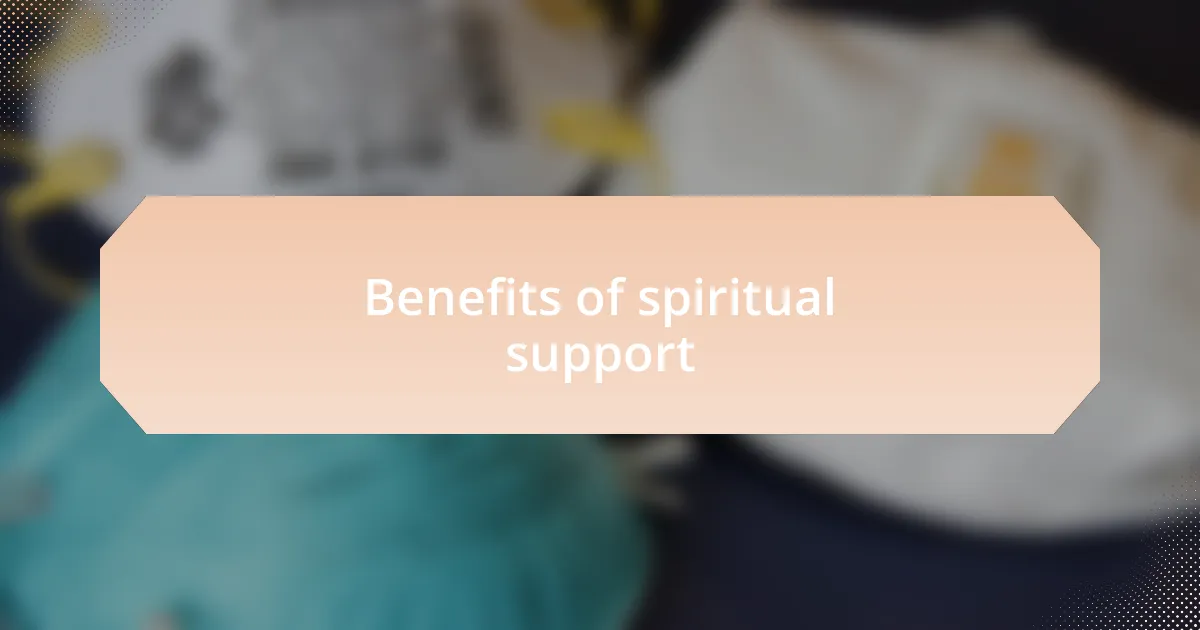
Benefits of spiritual support
One of the most profound benefits of spiritual support is its ability to facilitate connection during isolation. When I was grappling with my loss, I found myself retreating into my own thoughts, feeling detached from everyone around me. Yet, in those moments of vulnerability, I discovered that sharing my feelings with someone who understood the spiritual dimension of grief made everything feel a little less daunting. Have you ever noticed how shared spiritual moments can create an unspoken bond, making you feel less alone in your pain?
Spiritual support also provides a framework for understanding and processing grief. I remember sitting in a quiet chapel, where the chaplain shared comforting passages that resonated deeply. It was in that stillness that I found solace, as the words seemed to echo my own inner questions. Isn’t it amazing how a simple message can offer clarity when we’re lost? This guidance helped me navigate my emotional landscape, transforming confusion into a quest for peace.
Moreover, spiritual support encourages the exploration of meaning in loss. I once participated in a reflective discussion with fellow mourners, where we examined our loved ones’ legacies. It struck me how actively engaging with memory can weave a narrative that honors those we’ve lost while providing a sense of purpose in our grief. Have you ever felt that a person’s story continues to live on through the impact they had on others? This perspective not only wrapped me in comfort but also ignited my passion to celebrate life rather than solely mourn its absence.
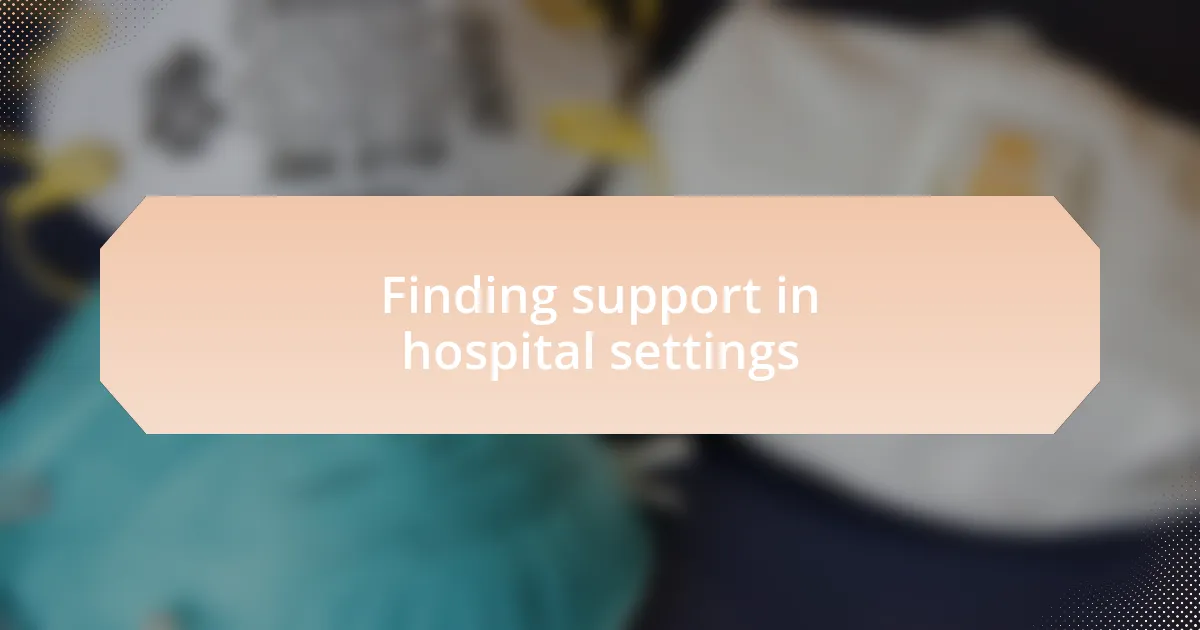
Finding support in hospital settings
Finding support in hospital settings often begins with the simple act of reaching out. When I was navigating those difficult days in the hospital, I found the presence of social workers and chaplains to be incredibly comforting. They not only listened but also guided me to resources that illuminated my path through grief. Have you ever felt that weight start to lift when someone genuinely cares for your well-being?
The informal support from fellow patients also played a crucial role in my healing journey. Sharing my story in the waiting room or the cafeteria, I encountered others who were experiencing similar loss. Those exchanges, often spontaneous and unexpected, created a sense of camaraderie that reminded me I wasn’t alone. Isn’t it fascinating how shared experiences can transform a sterile environment into a place of connection?
In hospital settings, I learned that support can come in many forms, including group therapy sessions. I vividly recall attending a gathering where we spoke openly about our losses, which allowed for expression I hadn’t realized I needed. The shared tears and laughter offered a profound sense of validation, reminding me that grief is a collective journey. Have you found that sometimes, the best support comes from those who are walking a similar path?
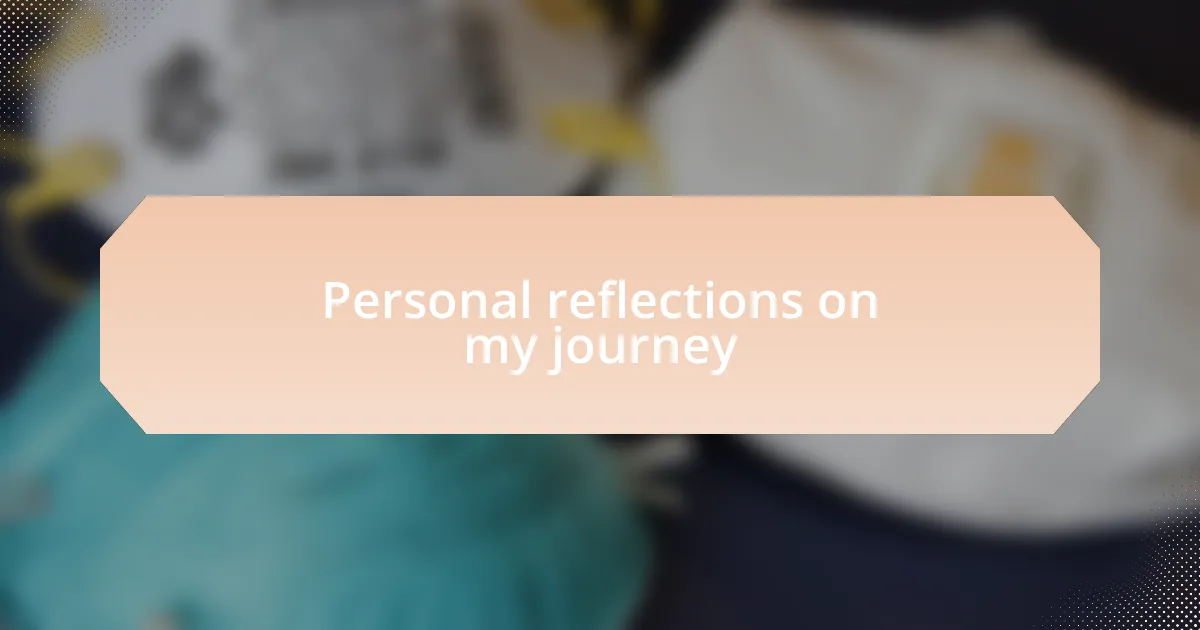
Personal reflections on my journey
Personal reflections on my journey
There were days when the weight of my grief felt unbearable, leaving me adrift in a sea of sorrow. I remember one quiet afternoon, standing by my parent’s hospital bed, feeling both lost and heartbroken. It was in that moment of deep despair that a compassionate nurse reached out, sharing her own story of loss, which reminded me that vulnerability can create a bridge of understanding.
As I navigated my journey, I often found solace in the small moments of beauty that emerged amidst the pain. One evening, as the sun dipped below the horizon, I looked out of the hospital window and glimpsed a breathtaking sunset. I felt a flicker of hope, realizing that even in grief, there are glimpses of light that can momentarily ease the heaviness in our hearts. Have you ever found unexpected joy in the midst of your own sorrow?
Reflecting on these experiences, I understand that grief is not a linear path. Some days felt like taking one step forward, only to stumble two steps back. Yet, through it all, I learned the importance of patience with myself. It gave me a deeper appreciation for how every tear shed and every memory cherished is a testament to the love we hold for those we’ve lost. How have your own reflections shaped your understanding of grief?
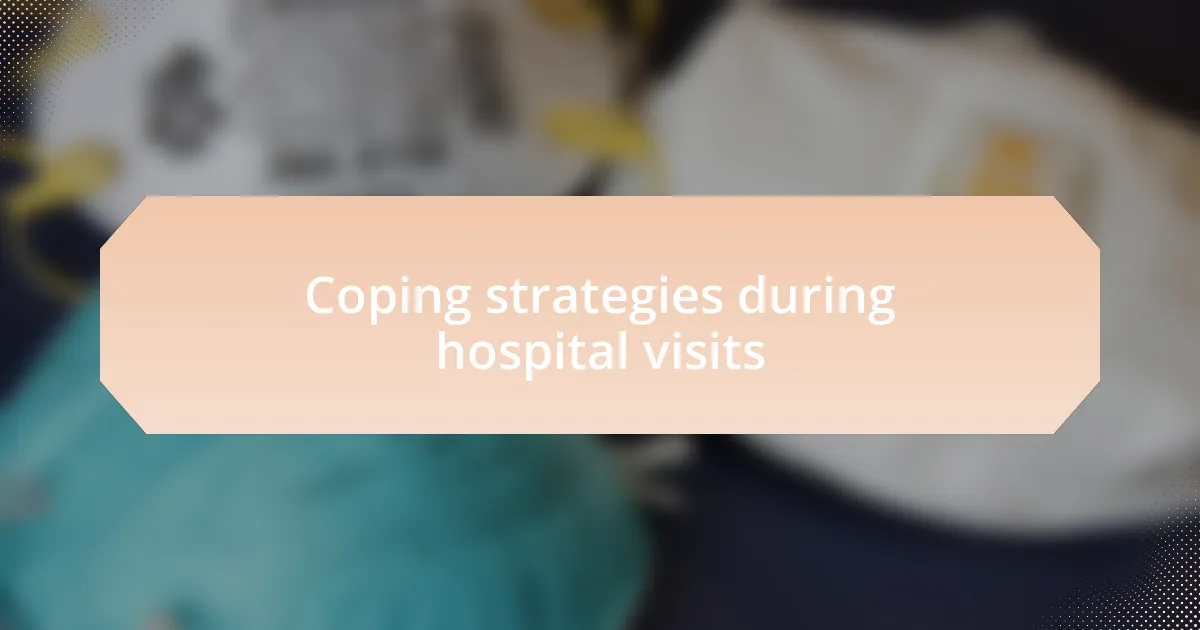
Coping strategies during hospital visits
During hospital visits, I found that establishing a small routine could offer a sense of normalcy amid chaos. For instance, I would bring along a comforting item, like my parent’s favorite blanket, and sit with it draped over my lap. This simple act reminded me of our shared moments together, creating a space where I felt a little less alone.
One technique that helped me cope was writing down my thoughts in a journal while seated in the waiting area. I poured out my feelings about my parent’s condition and my own struggles with grief. It was liberating. Have you ever expressed your emotions in writing? For me, it was a powerful release, transforming waves of sadness into something tangible.
Also, talking to other family members or friends present during visits brought warmth and support. Sharing memories of my parent created a bond that felt like a protective layer against the heaviness of grief. It made me wonder—how often do we overlook the healing power of connection? Those conversations reminded me that community can be a source of strength during challenging times.
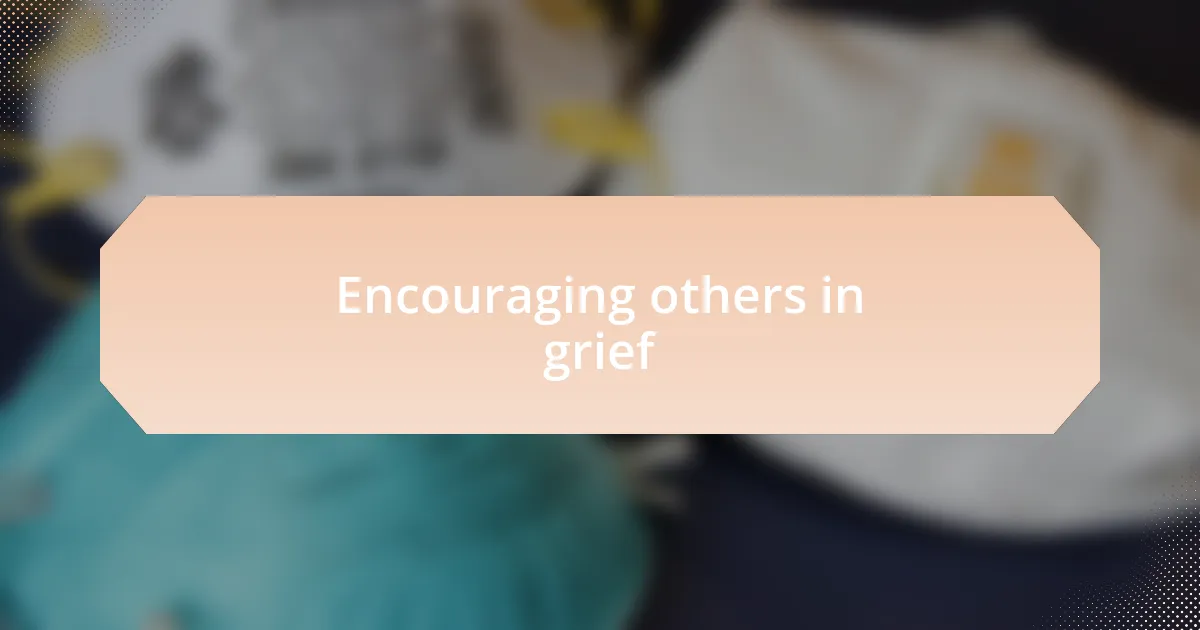
Encouraging others in grief
Encouraging others in grief isn’t just about saying the right words; it’s about being present. I remember sitting with a close friend who had lost her father. We simply shared silent moments, and it was during those times that I realized no grand gestures were needed; just my presence meant the world to her. Have you ever felt that your mere company could provide comfort?
Sometimes, I found that offering practical help, like cooking a meal or running errands, spoke louder than words. There was a time, after a friend lost his brother, when I showed up with a homemade casserole. It wasn’t just food; it was a tangible expression of my support, a message that he wasn’t alone in navigating the abyss of grief. Does lending a helping hand resonate with your experience in supporting someone in mourning?
Moreover, sharing memories during times of sorrow can be a source of solace. I initiated a small gathering among friends where we recalled joyful moments with our loved ones. It felt uplifting to celebrate their lives instead of solely focusing on the loss. Have you ever taken the time to reminisce with others? I noticed that this act not only honors the departed but also cements the bond we share in sadness, transforming grief into a collective healing journey.